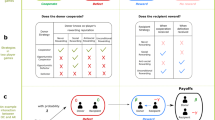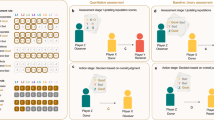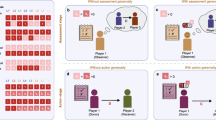Abstract
Human cooperation in social dilemmas challenges researchers from various disciplines. Here we combine advances in experimental economics and evolutionary biology that separately have shown that costly punishment and reputation formation, respectively, induce cooperation in social dilemmas. The mechanisms of punishment and reputation, however, substantially differ in their means for ‘disciplining’ non-cooperators. Direct punishment incurs salient costs for both the punisher and the punished, whereas reputation mechanisms discipline by withholding action, immediately saving costs for the ‘punisher’. Consequently, costly punishment may become extinct in environments in which effective reputation building—for example, through indirect reciprocity—provides a cheaper and powerful way to sustain cooperation. Unexpectedly, as we show here, punishment is maintained when a combination with reputation building is available, however, at a low level. Costly punishment acts are markedly reduced although not simply substituted by appreciating reputation. Indeed, the remaining punishment acts are concentrated on free-riders, who are most severely punished in the combination. When given a choice, subjects even prefer a combination of reputation building with costly punishment. The interaction between punishment and reputation building boosts cooperative efficiency. Because punishment and reputation building are omnipresent interacting forces in human societies, costly punishing should appear less destructive without losing its deterring force.
This is a preview of subscription content, access via your institution
Access options
Subscribe to this journal
Receive 51 print issues and online access
$199.00 per year
only $3.90 per issue
Buy this article
- Purchase on Springer Link
- Instant access to full article PDF
Prices may be subject to local taxes which are calculated during checkout





Similar content being viewed by others
References
Fehr, E. & Fischbacher, U. The nature of human altruism. Nature 425, 785–791 (2003)
Nowak, M. A. & Sigmund, K. Evolution of indirect reciprocity. Nature 437, 1291–1298 (2005)
Dawes, R. Social dilemmas. Annu. Rev. Psychol. 31, 169–193 (1980)
Hardin, G. The tragedy of the commons. Science 162, 1243–1248 (1968)
Boyd, R. & Richerson, P. J. Punishment allows the evolution of cooperation (or anything else) in sizable groups. Ethol. Sociobiol. 13, 171–195 (1992)
Fehr, E. & Gächter, S. Cooperation and punishment in public goods experiments. Am. Econ. Rev. 90, 980–994 (2000)
Fehr, E. & Gächter, S. Altruistic punishment in humans. Nature 415, 137–140 (2002)
Fehr, E. & Rockenbach, B. Human altruism: economic, neural, and evolutionary perspectives. Curr. Opin. Neurobiol. 14, 784–790 (2004)
Gürerk, Ö., Irlenbusch, B. & Rockenbach, B. The competitive advantage of sanctioning institutions. Science 312, 108–111 (2006)
Sutter, M., Haigner, S. & Kocher, M. Choosing the stick or the carrot? Endogenous institutional choice in social dilemma situations. CEPR Discussion Paper no. 5497 (Centre for Economic Policy Research, London, 2006)
Milinski, M., Semmann, D. & Krambeck, H.-J. Reputation helps solve the ‘tragedy of the commons’. Nature 415, 424–426 (2002)
Panchanathan, K. & Boyd, R. Indirect reciprocity can stabilize cooperation without the second-order free rider problem. Nature 432, 499–502 (2004)
Milinski, M., Semmann, D., Krambeck, H.-J. & Marotzke, J. Stabilizing the Earth’s climate is not a losing game: supporting evidence from public goods experiments. Proc. Natl Acad. Sci. USA 103, 3994–3998 (2006)
Ledyard, J. O. in Handbook of Experimental Economics (eds Kagel, J. H. & Roth, A. E.) 111–194 (Princeton Univ. Press, Princeton, 1995)
Botelho, A., Harrison, G. W., Pinto, L. M. C. & Rutström, E. E. Social norms and social choice. NIMA Working Paper no. 30 (Núcleo de Investigação em Microeconomia Aplicada, Univ. Minho, Braga, Portugal, 2005)
Masclet, D., Noussair, C., Tucker, S. & Villeval, M.-C. Monetary and nonmonetary punishment in the voluntary contributions mechanism. Am. Econ. Rev. 93, 366–380 (2003)
Sefton, M., Shupp, R. & Walker, J. The effect of sanctions in provision of public goods. CeDEx Discussion Paper no. 2002-02 (The Centre for Decision Research and Experimental Economics, Nottingham, 2002)
Alexander, R. D. The Biology of Moral Systems (de Gruyter, New York, 1987)
Nowak, M. A. & Sigmund, K. Evolution of indirect reciprocity by image scoring. Nature 393, 573–577 (1998)
Wedekind, C. & Milinski, M. Cooperation through image scoring in humans. Science 288, 850–852 (2000)
Bolton, G. E., Katok, E. & Ockenfels, A. Cooperation among strangers with limited information about reputation. J. Public Econ. 89, 1457–1468 (2005)
Seinen, I. & Schram, A. Social status and group norms: Indirect reciprocity in a repeated helping experiment. Eur. Econ. Rev. 50, 581–602 (2006)
Bshary, R. & Grutter, A. S. Image scoring and cooperation in a cleaner fish mutualism. Nature 441, 975–978 (2006)
Milinski, M. in Cooperation in Primates and Humans. Mechanisms and Evolution (eds Kappeler, P. M. & van Schaik, C. P.) 265–278 (Springer, New York, 2005)
Fehr, E. & Rockenbach, B. Detrimental effects of sanctioning on human altruism. Nature 422, 137–140 (2003)
De Quervain, D. J.-F. et al. The neural basis of altruistic punishment. Science 305, 1254–1258 (2004)
Singer, T. et al. Empathic neural responses are modulated by the perceived fairness of others. Nature 439, 466–469 (2006)
Haley, K. J. & Fessler, D. M. T. Nobody’s watching? Subtle cues affect generosity in an anonymous economic game. Evol. Hum. Behav. 26, 245–256 (2005)
Bateson, M., Nettle, D. & Roberts, G. Cues of being watched enhance cooperation in a real-world setting. Biol. Lett. 2, 412–414 (2006)
Fehr, E. Human behaviour: Don’t lose your reputation. Nature 432, 449–450 (2004)
Sigmund, K., Hauert, C. & Nowak, M. A. Reward and punishment. Proc. Natl Acad. Sci. USA 98, 10757–10762 (2001)
Brandt, H., Hauert, C. & Sigmund, K. Punishment and reputation in spatial public goods games. Proc. R. Soc. Lond. B 270, 1099–1104 (2003)
Fischbacher, U. Z-tree. Zurich Toolbox for Readymade Economic Experiments—Experimenter’s Manual. Working Paper no. 21 (Institute for Empirical Research in Economics, Univ. Zurich, 1999)
Acknowledgements
We thank S. Große, Ö. Gürerk, R. Sommerfeld and H.-J. Krambeck for support, and the University of Erfurt and the Max Planck Society for financial funding.
Author information
Authors and Affiliations
Corresponding authors
Ethics declarations
Competing interests
Reprints and permissions information is available at www.nature.com/reprints. The authors declare no competing financial interests.
Supplementary information
Supplementary Notes
This file contains Supplementary Methods and Supplementary Analysis. This file discusses extended Methods, instructions of the treatment PUN&IR and analysis of Interaction Effects. (PDF 108 kb)
Rights and permissions
About this article
Cite this article
Rockenbach, B., Milinski, M. The efficient interaction of indirect reciprocity and costly punishment. Nature 444, 718–723 (2006). https://doi.org/10.1038/nature05229
Received:
Accepted:
Issue Date:
DOI: https://doi.org/10.1038/nature05229
This article is cited by
-
Evolutionary Games and Applications: Fifty Years of ‘The Logic of Animal Conflict’
Dynamic Games and Applications (2023)
-
The Role of Structure-Seeking in Moral Punishment
Social Justice Research (2023)
-
Climate Action for (My) Children
Environmental and Resource Economics (2022)
-
Forward-Looking Belief Elicitation Enhances Intergenerational Beneficence
Environmental and Resource Economics (2022)
-
Positive downstream indirect reciprocity scale (PoDIRS–6): Construction and psychometric characteristics
Current Psychology (2022)
Comments
By submitting a comment you agree to abide by our Terms and Community Guidelines. If you find something abusive or that does not comply with our terms or guidelines please flag it as inappropriate.



